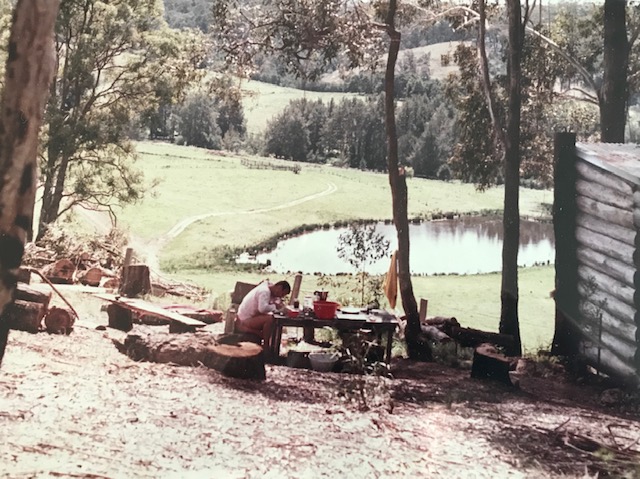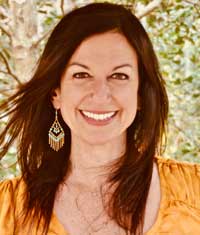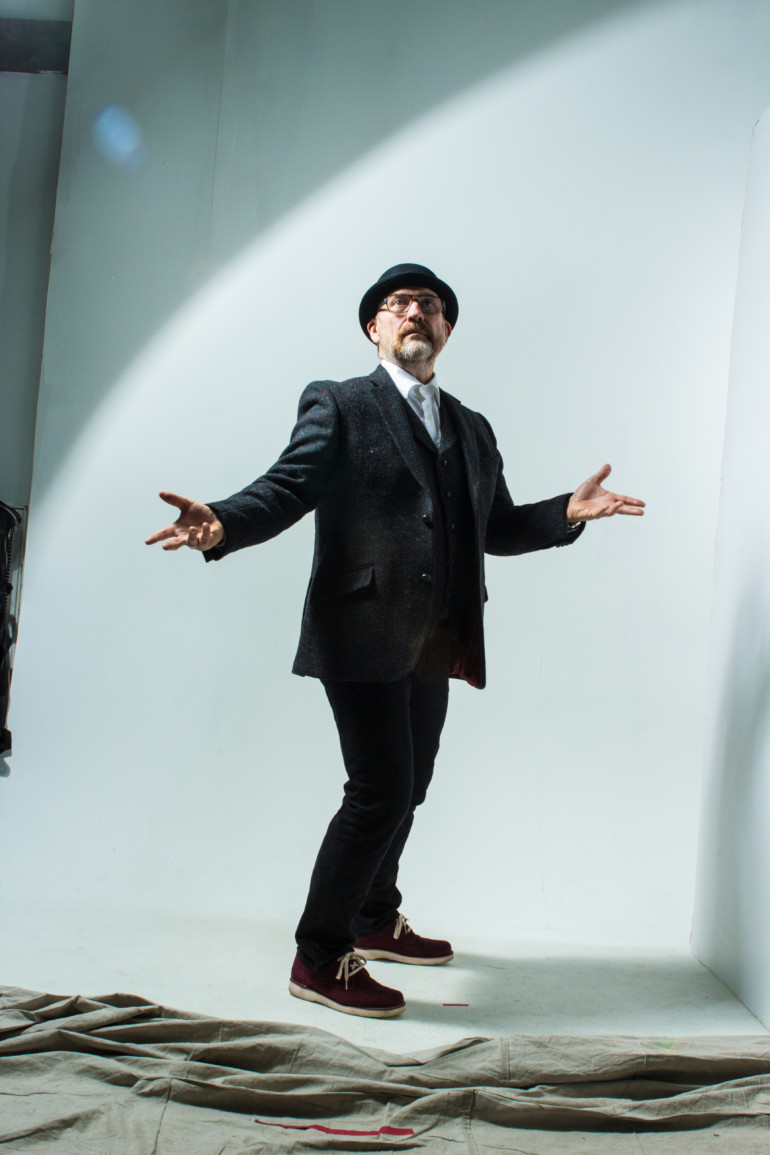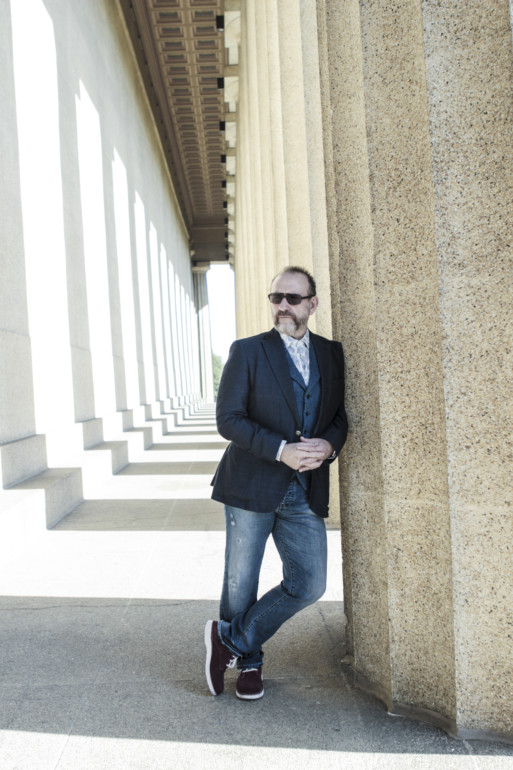Colin Hay’s story is one of surrender. Perhaps that’s how it has to be, when your whole life there’s only one path on which you ever cared to travel. “I’ve never gone for credibility, I’ve just gone for trying to connect with people wherever they are,” he says. “I didn’t have a plan. I just started going out on the road and playing shows because it’s all I really knew how to do.”
Born in 1953 on the southwest coast of Scotland, Hay spent ages five to 14 growing up in his Dad’s music shop. The family immigrated to Australia in 1967, where, Hay says in the documentary “Waiting for My Real Life to Begin,” his world instantly went from black and white to technicolor.
Never without a guitar in his hands, Hay was determined to make it in the music scene. He started out in a duo with Ron Strykert in 1978, and by 1981 three other members came on board to form Men at Work. That same year, Men at Work signed to a major record label and released their debut album, Business as Usual, which included the hits, “Who Can it Be Now?” and “Down Under.”
Business as Usual took the world by storm, dropping in the US while Men at Work was on tour opening for Fleetwood Mac. By the end of the tour, their album had hit number one on the Billboard charts, where it stayed for an unprecedented 15 weeks. To date, the album has sold over 15 million copies. Their second album, Cargo, released in 1983, was met with similar acclaim, reaching #3 on the charts and selling nearly 5 million copies worldwide. As their producer Peter McIan points out in “Waiting for My Real Life,” “They went from playing in a pub, to within two years flying in a helicopter over the US Festival on the way to be second on the bill with The Clash.” After winning a Grammy for Best New Artist in 1983, Men at Work seemed destined for lifelong super stardom, Colin Hay their frontman.
But by 1984, one year later, it was all over. Tensions between band members led to a fall as meteoric as their rise. Hay attempted a solo career, but his record label dropped him in 1991. In just a few years, he’d gone from playing stadiums and festivals with over 300,000 people in attendance to an audience of one, his road manager, at a small bar in Broome, Australia. It seemed his music career was finished.
Fast forward 30 years and 13 solo albums later, as Colin Hay begins his US solo tour in 2020. What changed? Well, for starters, Hay got sober. And he got real.
“I haven’t had a drink since 1991,” he told me. “That was my demon. You can’t use willpower, it doesn’t work – willpower is useless over addiction. I’d use my willpower to say I wasn’t an alcoholic and I’d stop drinking for 5-6 months but it was useless. If you are using your willpower to battle addiction it feels like every day you pick up the sword and go to battle and most of the time you do slay the dragon, but eventually you can’t win that game – you just have to not pick up the sword. You have to surrender.”
Anyone who knows Hay’s solo work knows his song, “Waiting for My Real Life to Begin,” and those profound lyrics he’s referencing, in particular:
When I awoke today, suddenly nothing happened
But in my dreams, I slew the dragon
For Hay, the song is about addiction, but also expectation.
“It was at a particular time in my life when I had certain expectations from life and I was repeating myself. I had fallen into that illusion, if you like, that things happen to you, that if you sit in one spot things are going to happen. It can be in all kinds of ways, it can be in love or relationships, it can be personal or professional. In my case, for example, I had been dropped by the industry. They were of the opinion I was past my use-by date. So every day it was the same in that I woke up and I was full of expectation of what the day was going to bring, and in that particular time in my life it brought nothing except me, except me looking in the mirror thinking, ok, well, let’s do something, what are you going to do?”
After success being so easily won with Men at Work, Hay realized, “I was going to have to start my life again and be a willing and engaged participant – otherwise, nothing was going to happen.”
Hay moved to LA, established his own record company called Lazy Eye Records, and started playing regularly at Largo, a popular club in LA., where the actor Zac Braff “discovered” him. Having his music on the TV show Scrubs and in the movie Garden State created a resurgence of interest in music, and he was picked up by Compass Records.
His latest album Fierce Mercy was released in 2017. Hay’s voice has the same raw strength and haunting quality that it did in the 80’s. When I ask for his secret, he says simply, “I’m lucky, I guess. I got my voice from my father. I sleep more now, but it’s also just genetics.”
There is something honest and uncomplicated in all of Hay’s answers. Fierce Mercy offers the same straightforwardness, with songs themed around health, mortality (including “She was the Love of Mine” about the passing of his Mom), politics (including “I’m Walking Here,” a tribute to Trayvon Martin), nostalgia, and pot use and the hope that abounded in the 60’s and 70’s.
When I ask Hay where he finds hope now, he says, “I don’t feel particularly inspired. I don’t even think you really have to. You have to realize that the world is in this swing towards authoritarianism. I wouldn’t say it’s terrifying but it has an insidious nature to it because it can be very dangerous. People have to get motivated to vote – it’s becoming more and more crucial.”
He adds, “The most crucial thing in the moment is climate change – climate change isn’t political. It’s going to take out everything in its path.” Hay’s activism led him to create VIP “Meet and Greets” along his tour, with all proceeds going to the NSW Rural Fire Service to fight the wildfires in Australia.
As our conversation winds down, I ask Hay again about the theme of surrender and how it plays a role in his outlook today. Though he claims to not be a spiritual person, opting instead for the term open-minded, his answer feels full of a certain kind of wisdom: “I learned that I don’t think you ever really get anywhere. You’re always in the process of getting somewhere but you never actually arrive. You live your life and you’re always becoming but you never actually become. You get somewhere and there’s always somewhere else to go. You just have to be where you are.”
Australia: A Letter to Cobargo
Colin Hay writes about his deep love of Australia in the wake of the country’s tragic wildfires.

My girlfriend Linda and I bought some bushland off the Cobargo-Bermagui road around 1976. Fifty five acres. It cost $9,000. I didn’t have $9,000 but Linda did, or close to it. I was lucky if I had $9. But I had a plan.
Cobargo lies about 700 kilometers north-east of Melbourne, right on the Princes Highway. I hitch-hiked there once, in 1978, and got dropped off at night at the Cobargo Hotel. I didn’t go in, but the hotel lights gave me comfort. Everywhere else was dark, very dark, except of course for the starlight, illuminating the sky, which was big, open and beautiful. As the engine of the car that dropped me off faded, there was silence, I mean complete silence. Nothing. It was glorious. The bush block however, was still 20 kilometers away, off the Cobargo-Bermagui road. I was going to have to walk, so I set off. As the lights of the hotel disappeared, the only things I could hear were my own footsteps, and my breathing. I had no flashlight, but I could just make out the white lines in the center of the road. They were my guide. I figured it would take me longer to walk the last 20 k, than it had to hitch the 700 odd to get to Cobargo. Suddenly, I was bathed in light from behind. It was a car, not just any car, but a GT Falcon with the round back lights, driving very fast, and going my way. I stuck out my thumb. He screeched to a halt, partly to avoid me, and as it turns out, to give me a lift. He was quite drunk. Very drunk actually, but quite means very in Australian. He was more than surprised to see me on the road. He’d been to the Cobargo Hotel, and done some fairly plucky elbow work, as David Niven would say. He drove furiously fast, I didn’t mind, he seemed to know the road very well. Occasionally he would turn and look at me, and grin. I watched as he sped off, after dropping me at the turn off. Again with the darkness.
I then had to negotiate my way through 50 odd acres of bush, which only had a barely visible track during the day. But I was happy. I had reached my destination of this small piece of paradise, a stone’s throw from some of the most awesome coastline on the planet. As I stumbled through the bush, I heard a noise. I stopped and listened. As my eyes grew more accustomed to my surroundings, I saw, not three feet in front of me, a grey kangaroo just standing staring at me. Unimpressed, he just hopped away. Needless to say, I was ecstatic to make it safe and sound to our small but comfortable tree hut, amidst the spotted gum. Linda was there. We stayed for a couple of weeks. During that time I wrote “Who Can It Be Now”, on that bush block off the Cobargo-Bermagui road. Linda said, “That’ll be your first hit”. And it was.
A lot has happened since then. Cobargo, at this very minute, like so much of southern NSW, and parts of Victoria, is in trouble, big trouble.
I’m about to head out on a solo tour across the US, from February through May. This year is the first time I’m doing what they call Meet and Greets before the performances. People pay extra money to say hi and hang a little before the show. All the proceeds of these will go to the NSW RURAL FIRE SERVICE.
So, if you’re coming along to a show, and you’re thinking about splashing out for the meet and greet, go for it. And know that your hard earned is going to support a great, honorable and brave organization, made up of people who risk their lives in the face of ever more furious fires.
Thanks,
Colin
Colin Hay is performing at Palace of Fine Arts in San Francisco on March 4, 2020. Tickets available here. His first single off Fierce Mercy is “A Thousand Million Reasons”.
 Emilie Rohrbach has taught music and theatre to grades pre-school through 8th in San Francisco and Marin counties for the last twenty years. She has been a freelance writer for Divine Caroline for five years, and her writing has appeared in Narratively, Hippocampus, Common Ground, Travelers’ Tales, and Marin Magazine, among others. She is passionate about Room to Read, Shanti Bhavan, and Destiny Arts and serves on the board of Knighthorse Theatre Company.
Emilie Rohrbach has taught music and theatre to grades pre-school through 8th in San Francisco and Marin counties for the last twenty years. She has been a freelance writer for Divine Caroline for five years, and her writing has appeared in Narratively, Hippocampus, Common Ground, Travelers’ Tales, and Marin Magazine, among others. She is passionate about Room to Read, Shanti Bhavan, and Destiny Arts and serves on the board of Knighthorse Theatre Company.



